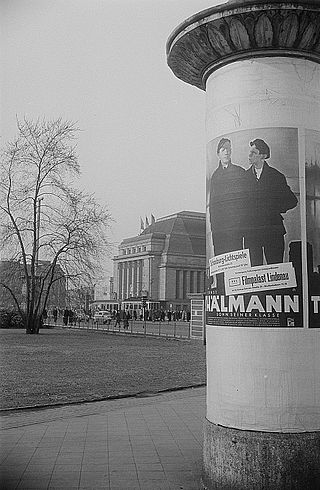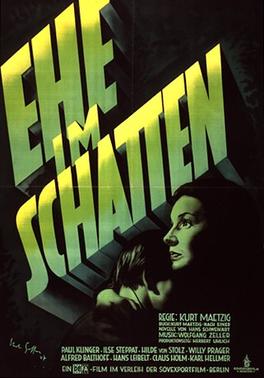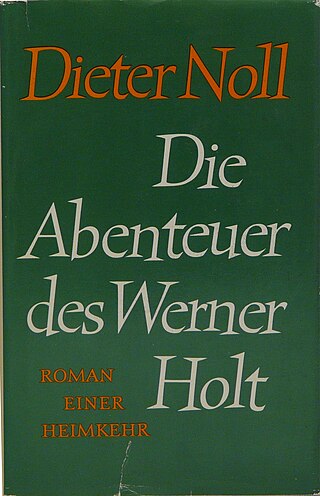
Ernst Thälmann is an East German film in two parts about the life of Ernst Thälmann, leader of the Communist Party of Germany during much of the Weimar Republic, directed by Kurt Maetzig and starring Günther Simon in the title role. The first part, Ernst Thälmann - Sohn seiner Klasse, was released in 1954. It was followed by the 1955 sequel. Ernst Thälmann - Führer seiner Klasse.

Dieter Noll was a German writer. His best known work is the two volume novel Die Abenteuer des Werner Holt from the early 1960s which had sold over two million copies by his death. The work was filmed in 1965.
Girls in Gingham —sometimes called Beaverskin—is a 1949 German drama film directed by Kurt Maetzig.
Duped Till Doomsday is a 1957 East German drama film directed by Kurt Jung-Alsen. It was entered into the 1957 Cannes Film Festival.

Naked Among Wolves is a 1963 East German film directed by Frank Beyer and starring Erwin Geschonneck and Armin Mueller-Stahl. The film is based on author Bruno Apitz's 1958 novel by the same name. The film was remade in 2015 under the direction of Philipp Kadelbach.

Marriage in the Shadows is 1947 German melodrama film directed by Kurt Maetzig and starring Paul Klinger, Ilse Steppat and Alfred Balthoff. It was produced in the Soviet zone in what later became East Germany and was released by DEFA. The film was described as an "attempt to confront the German people about the morals of the past", being the first film to confront the people about the persecution of the Jews and the atrocities conducted during World War II.

Familie Benthin is an East German film. It was released in 1950.
Der Rat der Götter is an East German black-and-white film, directed by Kurt Maetzig. It was released in 1950.
The Kaiser's Lackey is a 1951 East German film directed by Wolfgang Staudte, based on Heinrich Mann's 1918 satirical novel by the same name.
Shadow over the Islands is an East German black-and-white film, directed by Otto Meyer. It was released in 1952.

The Condemned Village is a 1952 East German propaganda film directed by Martin Hellberg.The film is about a man who returns from a Soviet prisoner-of-war camp to his home village in occupied West Germany and leads a resistance to the American military's plans to demolish the village to build an airfield. The film was commissioned to build East German opposition to the United States and support for the Soviet Union during the early Cold War.
Don't Forget My Little Traudel is an East German comedy film, directed by Kurt Maetzig. It was released in 1957.

The Sailor's Song is an East German black-and-white film directed by Kurt Maetzig and Günter Reisch. It was released in 1958.
An Old Love is an East German black-and-white film, directed by Frank Beyer. It was released in 1959.
Love's Confusion is an East German romantic comedy film directed by Slátan Dudow. It was released in 1959.

Die Abenteuer des Werner Holt is a novel in two parts by East German author Dieter Noll. The first volume was released at 1960 and the second in 1963. Noll won the National Prize of East Germany for the book, and it sold almost four million copies. The novel was incorporated into the country's school curriculum and was adapted to screen at 1965. The plot revolves around Werner Holt, a young German soldier who becomes disillusioned with the Nazis during the last days of World War II.
Zu jeder Stunde is an East German black-and-white film, directed by Heinz Thiel. It was released in 1960.
September Love is an East German film directed by Kurt Maetzig. It was released in 1961.
Sun Seekers is an East German film, directed by Konrad Wolf during 1958. It was banned and subsequently released only in 1972.
Joachim Kunert was a German film director and screenwriter. He directed more than 20 films between 1954 and 1989. His 1965 film The Adventures of Werner Holt was entered into the 4th Moscow International Film Festival.








